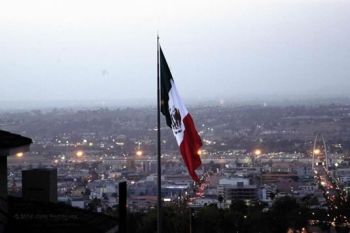
Publisher:
Bonnie King
CONTACT:
Newsroom@Salem-news.com
Advertising:
Adsales@Salem-news.com

~Truth~
~Justice~
~Peace~
TJP
Dec-30-2010 19:23

 TweetFollow @OregonNews
TweetFollow @OregonNews
Tijuana's Changed Migration Landscape
Salem-News.comStuck on the border, stranded young migrants become easy prey for prostitution and other rackets.
 Courtesy: rvtourscaravansazteca.com |
(TIJUANA, B.C.) - In Tijuana, the modalities of migration changed significantly during the decade of 2000-2010. Reinforced US border walls, stepped-up on-the-ground vigilance, zooming helicopters and high tech surveillance on the US side of the border forced would-be migrants into more dangerous passages. The transformed landscape dramatically increased the cost of crossing, and strengthened transnational outlaw groups that profit from trafficking migrants.
Simultaneously, the new travel conditions directly impacted life in Tijuana. Entrapped on the border, large populations of Mexican and Central American migrants not only bloated the reserve army of cheap labor for the factories that assemble goods for export to the United States, but also provided pools of recruits for the businesses of drug trafficking, prostitution and child pornography.
Today, three basic means exist of locally crossing the US border without papers. For a price ranging between two and three thousand dollars per person, migrants can pay smuggling gangs to steer them into risky mountain zones or the desert between Mexicali and Arizona. A second option involves paying a higher fee of between six and seven thousand dollars for passage through one of the so-called narco-tunnels that penetrate the California border, sometimes in return for helping to smuggle illegal narcotics.
A third way is by high-speed boats that embark from beaches around Rosarito and touch shore in the Golden State. The ocean cruise is a costly one, fetching smugglers from six to eight thousand dollars per ticket. Benedicto Ruiz, a Baja California professor who studies the migration phenomenon, said control of the immigrant smuggling system has shifted from the hands of old-time “polleros” to traffickers involved in a variety of illicit enterprises.
“No longer are they the traditional (smugglers), but groups of delinquents that charge migrants and look for another passage across the border…” Ruiz said in an interview with the Mexican press.
“The number of deaths has increased, because people try to cross the mountains of Tecate and La Rumorosa. They gear up, enter arid and difficult zones and die in the intent to cross. This is constant.”
Many migrants who do not reach the US wind up living in Tijuana’s expanding “belt of misery,” populating low-income neighborhoods including Valle Verde, Obrera, Lomas Taurinas, La Esperanza, El Nino, La Morita, and others. The numbers of new residents increased even as high rates of unemployment struck Tijuana after 2008.
Hundreds of youthful migrants, including young people deported from the United States, reportedly wander Tijuana’s streets searching for food, water and money. Some live along the local river, invisible to the state and society.
Stuck on the border, the stranded young migrants become easy prey for prostitution and other rackets or get sucked into the local drug economy as users and sellers.
Source: La Jornada, December 29, 2010. Article by Roberto Garduno.
Frontera NorteSur (FNS): on-line, U.S.-Mexico border news Center for Latin American and Border Studies
New Mexico State University
Las Cruces, New Mexico
Articles for December 29, 2010 | Articles for December 30, 2010 | Articles for December 31, 2010

Quick Links
DINING
Willamette UniversityGoudy Commons Cafe
Dine on the Queen
Willamette Queen Sternwheeler
MUST SEE SALEM
Oregon Capitol ToursCapitol History Gateway
Willamette River Ride
Willamette Queen Sternwheeler
Historic Home Tours:
Deepwood Museum
The Bush House
Gaiety Hollow Garden
AUCTIONS - APPRAISALS
Auction Masters & AppraisalsCONSTRUCTION SERVICES
Roofing and ContractingSheridan, Ore.
ONLINE SHOPPING
Special Occasion DressesAdvertise with Salem-News
Contact:AdSales@Salem-News.com


Salem-News.com:

Terms of Service | Privacy Policy
All comments and messages are approved by people and self promotional links or unacceptable comments are denied.
Yankee Joe December 31, 2010 7:20 pm (Pacific time)
This article is a crock and suffers from a "wanna-be" view of reality rather than the real thing. The article would have you believe that when the US tightened its border in the TJ area, it caused TJ's signficant problems, or at least pushed them from manageable to the out-of-control status. This is a lie. Mexico's corrupt government that cannot solve basic societal needs like sound and secure private property rights, basic security, and basic justice from police and public servants is the core cause for the despair and economic poverty of Mexico's population -- the true root of drug cartels, smuggling, and its citizens trying to escape to America. It is worth adding that one very significant smuggling route is right through the normal border crossing hidden in a vehicle or with forged documents - this is how most illegal immigrants I know crossed. I have lived in TJ for years and the lack of adequate private property rights is the root of Mexico's failed economy. Add its bent toward socialism and the corrupt government's control and mis-management of major segments of the economy (Petroleum, minerals, etc.) are the problem.
[Return to Top]©2025 Salem-News.com. All opinions expressed in this article are those of the author and do not necessarily reflect those of Salem-News.com.